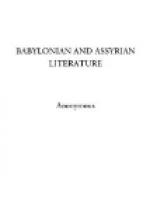Farewell! ye solitudes, farewell!
I will not moulder
rotting lie
With no one’s lips to
wish me well;
O give me immortality!
But what is fame? A bubble
blown
Upon the breeze,
that bursts its shell,
And all our brightest hopes
are flown,
And leaves our
solitude a hell.
The holy minstrel bows his head in woe,
And sweeps the harpstrings with a movement slow;
Then lifts his eyes toward the setting sun,
His evening invocation thus begun:
[14]O Samas! to the lifting
of my hands
Show favor! unto
me thy servant turn!
What man before thy blessed
Light withstands?
O thou! what mortal
thine own words can learn?
And who can rival them inviolate?
[15]Among the
gods no equal thou hast found.
In Heaven who of all the gods
is great?
O thou alone!
art great through Heaven’s bound!
On earth what man is great?
alas! no one,
For thou alone
art great! through earth’s vast bounds.
When wide thy awful voice
in Heaven resounds,
The gods fall
prostrate to our Holy One;
When on the earth thy voice
afar resounds,
The genii[16]
bow to thee and kiss the dust.
In thee, O Samas! do I put
my trust,
For thy great
love and mercy wide abounds!
O my Creator, God, thy watchfulness
O’er me,
oh may it never cease!
Keep thou the opening of my
lips! the fleece
Of purest snow
be my soul’s daily dress.
Guard thou my hands!
O Samas, Lord of Light!
And ever keep
my life and heart aright!
[Footnote 1: “Bar-ru,” an army officer]
[Footnote 2: “Su-bar-tu,” Syria]
[Footnote 3: “Bur-khi-is,” antelopes]
[Footnote 4: “Tsabi,” gazelles]
[Footnote 5: “Lig-bar-ri,” hyenas]
[Footnote 6: “Nes-i,” lions]
[Footnote 7: “Na-a-li,” spotted stags]
[Footnote 8: “Bu-hir-tser-i,” beasts of the field]
[Footnote 9: “Khar-sa-a-nu sa-qu-u-tu,” forests thick]
[Footnote 10: “Cu-uts-tsi,” storms.]
[Footnote 11: “Ca-ca-bi,” stars.]
[Footnote 12: “Tu-ra-a-khi,” deer.]
[Footnote 13: “Arme,” wild goats.]
[Footnote 14: This prayer is made up from Assyrian fragments now in the British Museum.]
[Footnote 15: See “Records of the Past,” vol. iii. p. 136.]
[Footnote 16: “Genii,” spirits.]
TABLET III—COLUMN I
HEABANI’S WISDOM—SONG OF THE KHAU-IK-I
The dark-eyed maids are dancing in the halls
Of Erech’s palace: music fills the walls
Of splendor where the Sar-dan-nu[1] enthroned,
His hours is whiling by the maidens zoned;
A whirling garland chanting forth a song.
Accompanied with harps thus sang the throng:




